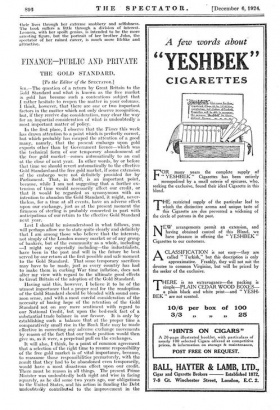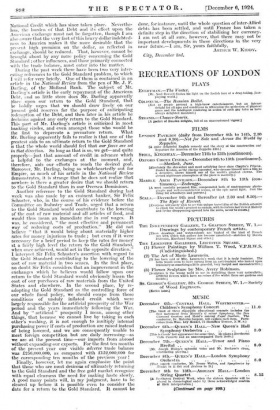FINANCE-PUBLIC AND PRIVATE
THE GOLD STANDARD.
[To the Editor of the SPECTATOR.] SIR,—The question of a return by Great Britain to the Gold Standard and what is known as the free market in gold has become such a contentious subject that I rather hesitate to reopen the matter in your columns. I think, however, that there are one or two important factors in the matter which not only deserve recognition, but, if they receive due consideration, may clear the way for an impartial consideration of what is undoubtedly a most important matter of policy.
In the first place, I observe that the Times this week has drawn attention to a point which is perfectly correct, but which probably has escaped the attention of a good many, namely, that the present embargo upon gold exports other than by Government licence—which was the technical form of our temporary abandonment of the free gold market—comes automatically to an end at the close of next year. In other words, by or before that time we should revert automatically to the effective Gold Standard and the free gold market, if some extension of the embargo were not definitely provided for by Parliament. That, in itself, is an important point, because, while I am not suggesting that a further ex- tension of time would necessarily affect our credit, or that it would be regarded as synonymous with an intention to abandon the Gold Standard, it might, never- theless, for a time at all events, have an adverse effect upon our exchange, just as at the present moment the firmness of sterling is probably connected in part with anticipations of our return to the effective Gold Standard next year.
Lest I should be misunderstood in what follows, you will perhaps allow me to state quite clearly and definitely that I am among those who believe that the interests, not simply of the London money market or of any group of bankers, but of the community as a whole, including —I might say especially including—the industrialists, have been in the past and will in the future be best served by our return at the first possible and safe moment to the Gold Standard. That some temporary sacrifices may have to be made, just as every country has had to make them in curbing War time inflation, does not alter my view with regard to the ultimate good effects to Great Britain of the adoption of the Gold Standard.
Having said this, however, I believe it to be of the utmost importance that a proper zeal for the readoption of the Gold Standard should be blended with sound com- mon sense, and with a most careful consideration of the necessity of basing hope of the retention of the Gold Standard not on any mere sentiment with regard to our National Credit, but upon the bed-rock fact of a substantial trade balance in our favour. It is only by establishing such a balance that at the proper time a comparatively small rise in the Bank Rate may be made effective in correcting any adverse exchange movements by reason of the fact that our trade position would then give us, as it were, a perpetual pull on the exchanges.
It will also, I think, be a point of common agreement that a selection of the right time to resume responsibility of the free gold market is of vital importance, because, to reassume those responsibilities prematurely, with the result that they had to be abandoned even temporarily, would have a most disastrous effect upon our credit. There must be reason in all things. The present Prime Minister was undoubtedly both right and wise in facing squarely, as he did some two years ago, our obligations to the United States, and his action in funding the Debt undoubtedly contributed to the improvement in the
National Credit which has since taken place. Neverthe- less, the burden of that Debt and its effect upon the American exchange must not be forgotten, though I am also aware that the very fact of this heavy dollar indebted- ness to America makes it the more desirable that the present high premium on the dollar, as reflected in exchange, should be reduced. That, however, cannot be brought about by any mere policy concerning the Gold Standard ; other influences, and those primarily connected with the trade balance, must enter into the matter.
During the past week there have been two very inter- esting references to the Gold Standard problem, to which
I will refer very briefly. One of them is contained in an article in the National Review from the pen of Mr. J. F. Darling, of the Midland Bank. The subject of Mr. Darling's article is-the early repayment of the American Debt, and so little store does Mr. Darling apparently place upon our return to the Gold Standard, that be boldly urges that we should draw freely on our present gold reserves for the purpose of anticipating redemption of the Debt, and then later in his article he declaims against any early return to the Gold Standard. This part of Mr. Darling's article is criticized in most banking circles, and even amongst those who would be the first to deprecate a premature return. What Mr. Darling apparently fails to realize is that one of the greatest aids to an ultimate return to the Gold Standard is that the whole world should feel that our faces are set in that direction. So long as that is so, we get—and quite properly—just that amount of credit in advance which is helpful to the exchanges at the moment, and, therefore, aids our efforts to reach the desired goal. Moreover, Mr. Darling, being so wholeheartedly out for Empire, as much of his article in the National Review demonstrates, it is strange that he does not realize that nowhere is there a greater desire that we should return to the Gold Standard than in our Oversea Dominions.
Another reference to the Gold Standard during last week was also made by an eminent banker, Sir Felix Schuster, who, in the course of his evidence before the Committee on Industry and Trade, urged that a return to the Gold Standard would contribute to the lowering of the cost of raw material and all articles of food, and would thus mean an immediate rise in real wages. It was, he considered, " the most effective and permanent way of reducing costs of production." He did not believe " that it would bring about materially higher rates for money injurious to trade ; but even if it were necessary for a brief period to keep the rates for money at a fairly high level the return to the Gold Standard, when once achieved, would act in the opposite direction." I interpret Sir Felix Schuster's assertion with regard to the Gold Standard contributing to the lowering of the cost of raw material in two senses. In the first place, no doubt Sir Felix considers that an improvement in the exchanges which he believes would follow upon our return to the Gold Standard would obviously lessen the cost of our purchases of raw materials from the United States and elsewhere. In the second place, by re- adopting the Gold Standard as the controlling force of our whole fiscal policy, we should escape from those conditions of unduly inflated credit which were largely responsible for the artificial prosperity of the War period and the years immediately following the War. And by " artificial " prosperity I mean, among other things, that because we cannot live by taking in each other's washing, it is not enough to multiply internal purchasing power if costs of production are raised instead of being lowered, and we are consequently unable to meet foreign competition but are daily increasing—as we are at the present time—our imports from abroad without expanding our exports. For the first ten months of the present year our visible adverse trade balance was £256,000,000, as compared with £152,000,000 for the corresponding ten months of the previous year !
Finally, however, let me again emphasize the point that those who are most desirous of ultimately returning to the Gold Standard and the free gold market recognize with equal clearness the need for making haste slowly. A good many points will, in my judgment, have to be cleared up before it is possible even to consider the date for a return to the Gold Standard, It cannot be
done, for instance, until the whole question of inter-Allied debts has been settled, and until France has taken a definite step in the direction of stabilizing her currency. I am not at all sure, however, that there may not be important developments in these directions in the very near future.—I am, Sir, yours faithfully, ARTHUR W. KIDDY.
City, December 3rd.



















































 Previous page
Previous page